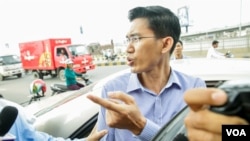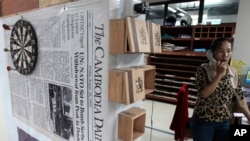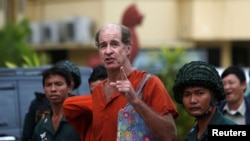More than two months after their arrest for alleged espionage, the families of two former Radio Free Asia reporters, Yeang Sothearin and Uon Chhin, are appealing for their release.
Vann Chantha, the wife of Yeang Sothearin, told VOA recently that it was an injustice that her husband was arrested and charged with espionage.
“I hope that the court helps seek justice [for my husband]. He did not do anything wrong, and it’s an injustice to detain him,” said Vann Chantha, the mother of two children.
Yeang Sothearin and his colleague, Uon Chhin, another former RFA reporter, were arrested in November and charged with espionage under a vaguely worded provision in the penal code that criminalizes passing information to a foreign state that could damage national security. They could face up to 15 years in jail if found guilty.
Their arrest took place amid a sweeping government crackdown on the country’s main opposition party and independent voices across many sectors, including civil society and independent media.
As part of the crackdown, independent news outlets Radio Free Asia and The Cambodia Daily were accused of being tax delinquent. Both organizations subsequently shut down their newsrooms in Cambodia, although RFA Khmer, which is based in Washington, DC, continued to broadcast from abroad.
However, Yeang Sothearin and Uon Chhin were accused of continuing to covertly work for RFA, and were arrested at a hotel in Phnom Penh with computers and audio equipment. RFA has said the two were not reporting for RFA at the time of their arrests.
Vann Chantha reiterated that her husband had formally quit working for RFA Khmer. On the day of his arrest, she said, her husband was just checking on what happened to Uon Chhin and ended up getting caught up in the situation.
“He did not do anything wrong, and he should be released. The situation has become very difficult for me,” she said.
Kheng Sina, wife of Uon Chhin, also told VOA in a recent interview that she hoped the court would find justice for her husband.
“Since he was arrested and detained, my family situation has become very dire. He is the breadwinner of the family. I would like to appeal to the court to seek justice for him so that he will be freed,” she said.
Their petition for release is currently before the Supreme Court after bail requests filed by both journalists were denied by the Phnom Penh Municipal Court and the Court of Appeal.
Keo Vanny, the pair’s defense lawyer, said that the charges against them were baseless. “The charge claims [they did something] harmful to national security. Even now, I don’t see what harm was allegedly committed by them,” he said.
Australian filmmaker James Ricketson was also jailed under the same provision in June for flying a drone at an opposition rally, while two former Cambodia Daily reporters were charged with incitement in October over questions they asked while reporting in Ratanakkiri province during the lead-up to local elections in June.
Shawn Crispin, the senior Southeast Asia representative for the Committee to Project Journalists, said that arrests and threats against members of the press corps by the Cambodian government were “a clear and present danger to press freedom.”
“By silencing the country's few independent voices, Hun Sen's regime has done a disservice to his people and their right to information,” said Crispin.
“Journalists should never be imprisoned for their reporting activities. We call for the release of all journalists currently held behind bars in Cambodia and end to all legal harassment and intimidation of the media,” he added.
Sok Eysan, a spokesman for the ruling Cambodian People’s Party, insisted that the case against the RFA journalists was based on “the rule of law.” He said the reporters’ families and other advocates for their freedom should leave the matter to the court.
“The court is handling it,” he said, adding that if they were innocent, they would eventually be released.
However, Soeng Sen Karuna, a senior investigator for rights group Adhoc, said if Cambodia continued to restrict press freedom, it would damage its international reputation.
“It makes the country look bad because we are a democratic country, and it’s important that freedom of the press is open, based on democratic principles,” he said.
A prosperous society needs independent journalists who have the freedom to do their job without any intimidation, he added.









